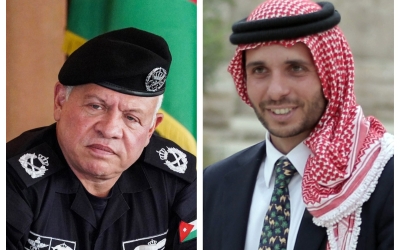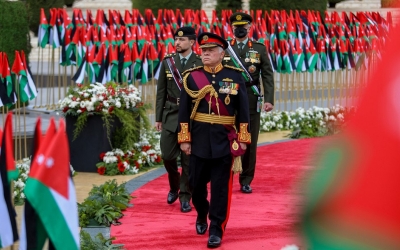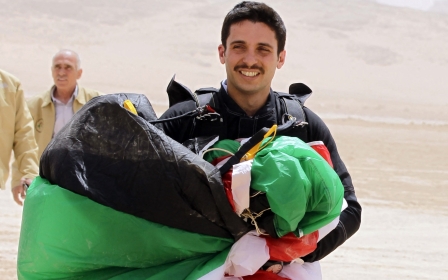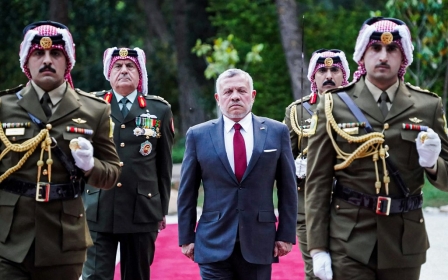Jordan's Prince Hamzah apologises to king for his plot 'mistake'
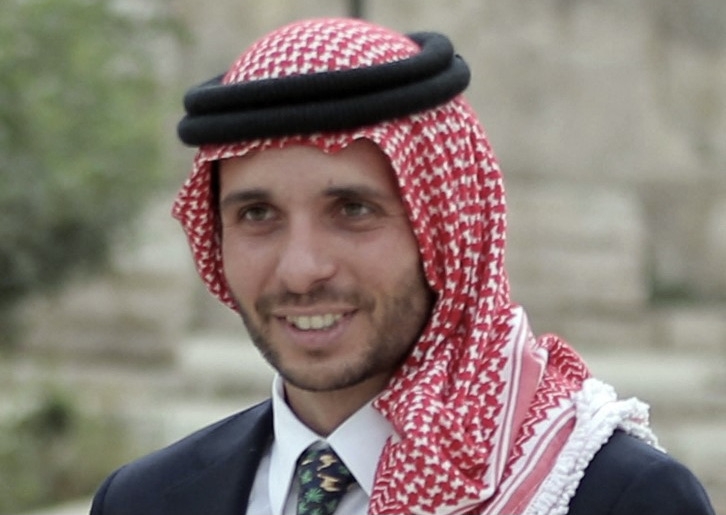
Jordan said on Tuesday that King Abdullah II had received a letter of apology from Prince Hamzah, who last year was accused of conspiring to destabilise the country and remove its longtime monarch.
In the letter, released by the official Jordan News Agency, Prince Hamzah, the king's half-brother, wrote that he made "a mistake" and that he took responsibility for the "abuses I have taken against [the king] and our country".
"Last year, our dear Jordan, passed through a difficult circumstance and an unfortunate chapter," Prince Hamzah, crown prince until 2004, wrote. "The months that have passed since that time have provided me with an opportunity for self-reflection, and frankness with myself… I made a mistake.
'The months that have passed since that time have provided me with an opportunity for self-reflection, and frankness with myself… I made a mistake'
- Prince Hamzah bin Hussein
"As I bear my national responsibility for the attitudes and abuses I have taken against his majesty the king and our country during the past years and the events that followed in the case of sedition, I hope for your forgiveness, which we are so accustomed to from your majesty… I apologise to your majesty, the Jordanian people, and our family for all these behaviours, which will not be repeated."
Last April, Prince Hamzah was detained at home in Amman after being accused of fomenting unrest in the kingdom, although the government denied he had been arrested.
New MEE newsletter: Jerusalem Dispatch
Sign up to get the latest insights and analysis on Israel-Palestine, alongside Turkey Unpacked and other MEE newsletters
Jordanian authorities arrested at least 16 people in relation to the alleged plot, which exposed deep rifts within the royal family and rocked the kingdom's image as a bastion of stability and security in a volatile region.
In statements following the arrests, King Abdullah said the crisis was "the most painful" because it came partially from inside the royal family.
Limiting speculation
The monarchy tried to limit speculation over a wider dispute between royals, with the king saying Hamzah's case was being handled as a private matter within the Hashemite family.
"We asked him to stop activities and movements that are used against Jordan's stability," the Jordanian army said in a statement.
Sharif Hassan bin Zaid, a member of the royal family, and senior ex-official Bassem Awadallah, were also arrested and labelled as the plot's masterminds.
Prince Hamzah, the son of late King Hussein and his last wife, Queen Noor, is a well-known figure who has reportedly been critical of the Hashemite monarchy under his half-brother's reign.
The exact whereabouts of Prince Hamzah is not known.
He has not been seen in public for months and was prevented from testifying at a trial in which his alleged accomplices were convicted of sedition and sentenced to 15 years in prison.
Last November, in a rare glimpse into the dispute, Queen Noor said that her son was still not free, which seemed to indicate the spat between the royal brothers was still festering.
In a tweet marking the birthday of her granddaughter Zein, she wrote: "Inshallah, her father will be justly freed ASAP, and able to provide a natural, hopeful and uplifting, and genuine Jordanian upbringing for her and all the family".
Saudis implicated
Awadallah, a former head of the royal court, was arrested after Jordan’s intelligence services intercepted and deciphered encrypted voice and text messages between him and Saudi Crown Prince Mohammed bin Salman, a source close to the investigation told Middle East Eye.
The two men discussed how and when to use mounting popular unrest in Jordan, stoked by the kingdom’s flagging economy and the Covid-19 pandemic, to destabilise the rule of King Abdullah II.
The messages between Awadallah and Mohammed bin Salman were regarded as definitive enough proof of a plot hatched by a foreign power for the Jordanians to share it immediately with their US counterparts. They then reported back to US President Joe Biden.
According to an Arab source who previously considered himself a friend of Awadallah, the Jordanian businessman began passing messages to Hamzah shortly after he definitely split with King Abdullah in November 2018.
Awadallah had been close to Abdullah. He was head of the royal court and then finance minister. He was then dismissed, but the close relationship between Awadallah and the king continued.
He was appointed the Jordanian royal court’s special envoy to Saudi Arabia and claimed a part in negotiating the establishment of a Saudi-Jordanian Coordination Council, a vehicle launched in 2016 that Amman hoped would bring in billions of dollars, which never materialised.
Growing corruption
One of the allegations against Hamzah was that he was growing too close to Jordan's East Bank tribes.
Traditionally a bedrock of support for the monarchy, more recently the tribes have felt marginalised as the palace cut back on public handouts that have been central to maintaining allegiance in a system heavily reliant on government patronage.
King Abdullah II has also come under fire for his handling of the country's economy and growing corruption within the country.
Jordan is heavily reliant on western aid, and its image was battered last year after the king's vast overseas property portfolio was exposed in the "Pandora Papers" leak.
After claiming he had been put under house arrest, Hamzah spoke out using social media and the press, accusing Jordan's rulers of corruption and ineptitude.
Those comments, stemming from a palace insider, struck a chord with many ordinary citizens who have been unable to critique their government, as space for public dissent inside the country shrinks.
Last year, the US advocacy group Freedom House downgraded Jordan from "partly free" to "not free".
Middle East Eye delivers independent and unrivalled coverage and analysis of the Middle East, North Africa and beyond. To learn more about republishing this content and the associated fees, please fill out this form. More about MEE can be found here.


